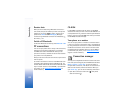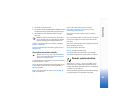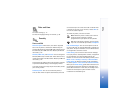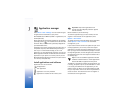
Tools
90
User name—The user name may be needed to make a data
connection, and is usually provided by the service
provider. The user name is often case-sensitive.
Prompt password—If you must enter a new password
every time you log in to a server, or if you do not want to
save your password in the phone, choose Yes.
Password—A password may be needed to make a data
connection, and is usually provided by the service
provider. The password is often case-sensitive.
Authentication—Select Normal or Secure.
Homepage—Depending on what you are setting up,
write the Web address or the address of the multimedia
messaging center.
Select Options > Advanced settings to change the
following settings:
Network type—Select the Internet protocol type to use
IPv4 or IPv6.
Phone IP address—Enter the IP address of your phone.
Name servers—In Primary name server:, enter the IP
address of the primary DNS server. In Second. name
server:, enter the IP address of the secondary DNS server.
Contact your Internet service provider to obtain these
addresses.
The domain name service (DNS) is an Internet service that
translates domain names such as www.nokia.com
into IP
addresses such as 192.100.124.195.
Proxy serv. address—Define the address for the proxy server.
Proxy port number—Enter the proxy port number.
Packet data
The packet data settings affect all access points using a
packet data connection.
Packet data conn.—If you select When available and you
are in a network that supports packet data, the phone
registers to the packet data network. Also, starting an
active packet data connection is quicker (for example, to
send and receive e-mail). If you select When needed, the
phone uses a packet data connection only if you start an
application or action that needs it. If there is no packet
data coverage and you select When available, the phone
periodically tries to establish a packet data connection.
Access point—The access point name is needed to use your
phone as a packet data modem to your computer.
Configurations
You may receive trusted server settings from your network
operator or service provider in a configuration message, or
the settings may be stored on your SIM or USIM card. You
can save these settings to your phone, or view or delete
them in Configurations.


















